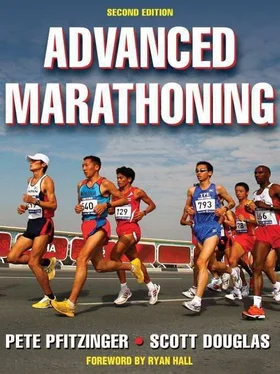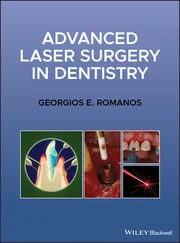Pfitzinger Pete - Advanced Marathoning
Здесь есть возможность читать онлайн «Pfitzinger Pete - Advanced Marathoning» весь текст электронной книги совершенно бесплатно (целиком полную версию без сокращений). В некоторых случаях можно слушать аудио, скачать через торрент в формате fb2 и присутствует краткое содержание. Год выпуска: 2008, Издательство: Human Kinetics - A, Жанр: Спорт, на английском языке. Описание произведения, (предисловие) а так же отзывы посетителей доступны на портале библиотеки ЛибКат.
- Название:Advanced Marathoning
- Автор:
- Издательство:Human Kinetics - A
- Жанр:
- Год:2008
- ISBN:нет данных
- Рейтинг книги:5 / 5. Голосов: 1
-
Избранное:Добавить в избранное
- Отзывы:
-
Ваша оценка:
- 100
- 1
- 2
- 3
- 4
- 5
Advanced Marathoning: краткое содержание, описание и аннотация
Предлагаем к чтению аннотацию, описание, краткое содержание или предисловие (зависит от того, что написал сам автор книги «Advanced Marathoning»). Если вы не нашли необходимую информацию о книге — напишите в комментариях, мы постараемся отыскать её.
Advanced Marathoning — читать онлайн бесплатно полную книгу (весь текст) целиком
Ниже представлен текст книги, разбитый по страницам. Система сохранения места последней прочитанной страницы, позволяет с удобством читать онлайн бесплатно книгу «Advanced Marathoning», без необходимости каждый раз заново искать на чём Вы остановились. Поставьте закладку, и сможете в любой момент перейти на страницу, на которой закончили чтение.
Интервал:
Закладка:
The other school of thought is that ferritin reflects the iron stores the body can use to make enzymes for oxidative energy production; therefore, they have a direct impact on performance. The optimal level of serum ferritin seems to differ among individuals. Dick Telford, PhD, of the Australian Institute of Sport, has found that the performance of some runners seems to be affected when their ferritin levels drop below 50 ng/ml, whereas others perform fine if their ferritin levels remain above 25 ng/ml. Telford says that even with iron supplementation, some runners have difficulty raising their ferritin levels above 50 ng/ml.
David Martin, PhD, who has been in charge of testing elite distance runners for USA Track and Field since 1981, says that in his experience with runners, training and racing performances are usually affected when ferritin levels drop below 20 ng/ml. When those athletes increase their ferritin levels above 25 ng/ml, they experience a rapid turnaround in performance. These experiences indicate that a ferritin level between 25 and 50 ng/ml may be normal or low depending on your individual physiology, but a ferritin level below 25 ng/ml is a definite red flag for a runner.
According to the National Academy of Sciences’ 1989 recommended daily allowances (RDAs), premenopausal women need about 15 milligrams of iron a day, whereas men and postmenopausal women require 10 milligrams of iron a day. Iron requirements haven’t been established for high-mileage runners, so all that can be said with confidence is that marathoners need at least the RDA. As with any mineral, too much iron can be a health hazard. In fact, the typical American man is more likely to get an iron overload than to be iron deficient.
As with other running problems, such as injuries, the best strategy is to avoid low iron in the first place. Good food sources of iron include liver, lean meat, oysters, egg yolk, dark green leafy vegetables, legumes, dried fruit, and whole-grain or enriched cereals and bread.
Dr. E. Randy Eichner, chief of hematology at the University of Oklahoma Health Sciences Center, offers these tips to prevent iron deficiency:
• Eat 3 ounces (90 g) of lean red meat or dark poultry a couple of times a week.
• Don’t drink coffee or tea with meals because they reduce iron absorption.
• Eat or drink foods rich in vitamin C with meals to increase iron absorption.
• Use cast-iron cookware (particularly for acidic foods such as spaghetti sauce).
Although these recommendations may seem like subtle changes in diet, they can have a powerful effect on your iron levels. For example, you’ll absorb three times as much iron from your cereal and toast if you switch from coffee to orange juice with breakfast. Both Eichner and Martin recommend taking iron supplements, in the form of ferrous sulfate, ferrous gluconate, or ferrous fumarate, only if necessary after making the recommended dietary changes.
Supplements and Other Ergogenic Aids
Ergogenic aids are substances that may enhance athletic performance. In The Ergogenics Edge , Melvin Williams, PhD, classifies ergogenic aids as nutritional aids (e.g., vitamins, minerals, protein supplements, carbohydrate supplements, bee pollen, and ginseng), pharmacological aids (drugs such as anabolic steroids and amphetamines), or physiological aids (e.g., human growth hormone, EPO, creatine, and glycerol) (Williams 1998). Most supposed ergogenic aids have no scientific evidence to support their use and will do nothing to improve your running performance.
The multimillion-dollar supplement industry is poorly regulated, with the result that many unsubstantiated claims are made. The advent of unregulated Internet sites pushing supplements with advertisements written as though they’re the results of scientific studies has made it even harder for runners to know what works. It doesn’t help when famous athletes endorse these products. The manufacturer tells the athlete wonderful things about the supplement, and the athlete gets paid to build credibility for the product by repeating those wonderful things. As a result, many people waste money on products that neither harm nor help performance.
Taking supplements that you know little about also carries a risk, as they may contain harmful or illegal substances. For example, many athletes who failed drug tests for the steroid nandrolone in the 1990s claimed that small amounts of the substance or of a precursor of nandrolone must have been in one of the supplements they were taking. (Of course, almost everyone who fails a drug test claims the result is false.)
Are there any legal pills you can pop that will help your running performance? The answer is yes, and the list is short. We could spend page after page discussing the supplements that don’t work. In The Ergogenics Edge , Williams discusses 61 types of supplements and drugs that claim to improve athletic performance. Thirty-nine of those claim to improve aerobic endurance, which, if true, would improve marathon performance. Imagine how fast you would run if you took all 39! In reality, you would be a lot poorer and would still need to eat a healthy diet to get the nutrients you need. Let’s look at supposed ergogenic aids by category.
The many nutritional supplements available on the market can be put into the following four categories:
1. Those that have been clearly shown to enhance endurance performance
2. Those that lack evidence from well-controlled scientific studies that they enhance endurance performance
3. Those that enhance performance only if you have a nutrition deficiency
4. Those that require more research
Category 1 includes only carbohydrate supplements and fluid. We have already discussed these topics in depth.
Category 2 includes almost all nutritional supplements that make miraculous claims, including ginseng, bee pollen, and various herbs and plant extracts.
Category 3 includes most vitamins and minerals that have an established RDA. If you fall below the RDA for a prolonged time, you’ll develop a nutrition deficiency that could inhibit your running performance and your ability to recover. All of the vitamins and minerals you need can be obtained from foods. Vitamin and mineral supplements are expensive, and relying on them for your vitamin and mineral needs is simply an admission that the quality of your overall diet is poor.
Within category 4, evidence exists that antioxidants can help marathoners and other endurance athletes. Antioxidants work by neutralizing oxygen free radicals, which are formed during aerobic metabolism. Free radicals damage cell membranes and other parts of muscle cells. Antioxidant supplementation, therefore, reduces the damage caused by free radicals. Antioxidants may also help maintain immune function after strenuous exercise. The most commonly used antioxidants are beta carotene (precursor to vitamin A), vitamin C, vitamin E, and selenium.
Studies on the benefits of antioxidant supplementation have had mixed results – some show links between antioxidant supplementation and reduced muscle damage, whereas others show no benefit. Similar mixed results have been reported for the role of antioxidants in maintaining immune function. In one study, runners who took 600 milligrams of vitamin C a day for 3 weeks had more than 50 percent fewer head colds after the Comrades ultramarathon than did runners taking a placebo.
As more evidence accumulates, it’s prudent to take only moderate doses of antioxidants. Large doses of one vitamin or mineral may lead to decreased absorption of other nutrients, decreased immune function, or both. For example, studies have found that very high doses of vitamin E, vitamin D, or zinc reduce immune function.
Читать дальшеИнтервал:
Закладка:
Похожие книги на «Advanced Marathoning»
Представляем Вашему вниманию похожие книги на «Advanced Marathoning» списком для выбора. Мы отобрали схожую по названию и смыслу литературу в надежде предоставить читателям больше вариантов отыскать новые, интересные, ещё непрочитанные произведения.
Обсуждение, отзывы о книге «Advanced Marathoning» и просто собственные мнения читателей. Оставьте ваши комментарии, напишите, что Вы думаете о произведении, его смысле или главных героях. Укажите что конкретно понравилось, а что нет, и почему Вы так считаете.










